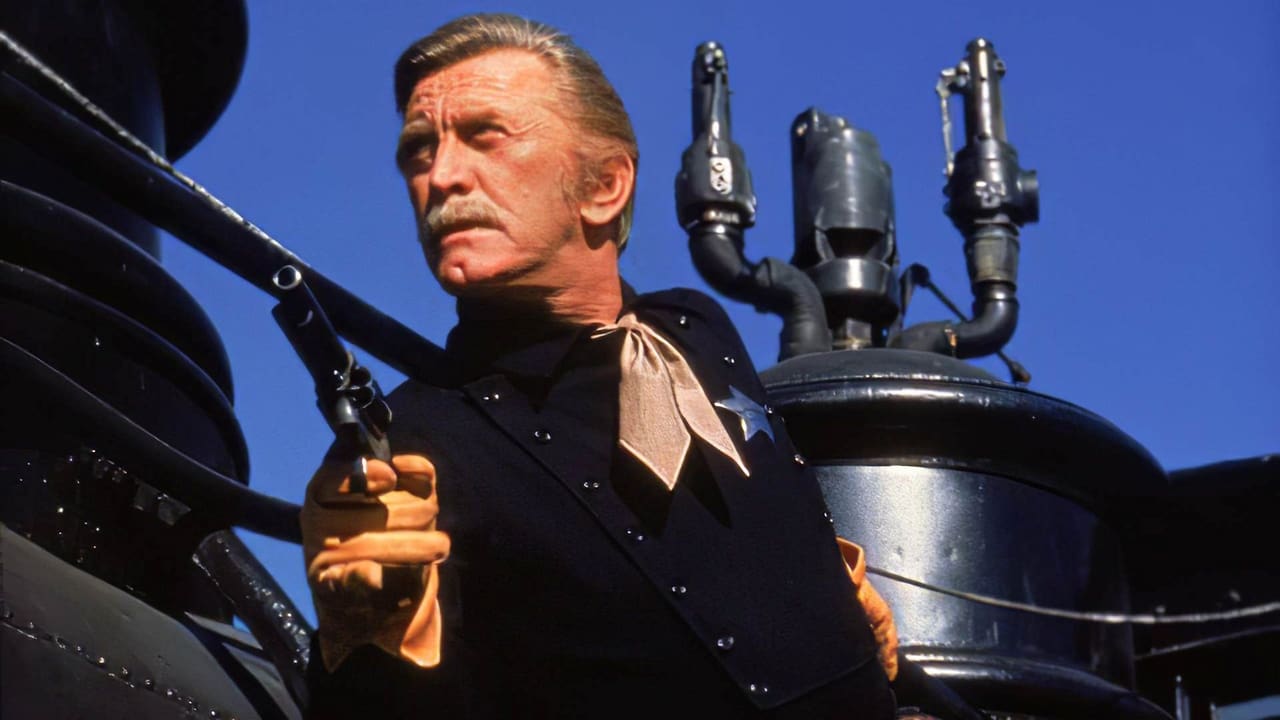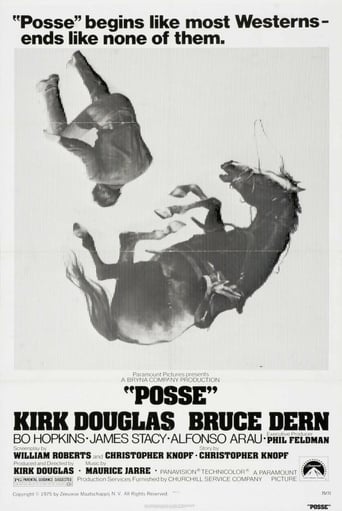

I agree with inspectors71's review in that Kirk Douglas was probably a much better actor than director. This, and his previous film, help prove this.Other than a unique chance to see Kirk directing (and producing), this film is only memorable for being a 1970s "anti-Western"--with bad guys seeming pretty nice and good guys as hypocritical jerks. Once again, inspectors71's feeling that this was all inspired by Watergate seemed pretty astute. During this time period, flawed heroes abounded in film--such as Dirty Harry Popeye Doyle--a product of the times indeed. As an "anti-Western", the film didn't seem to go anywhere and left me feeling rather uninterested.In fact, the entire story never felt particularly involving and the "anti-ending" seemed amazingly far-fetched and silly. Still, there were enough interesting moments to make it worth watching if nothing better is on TV--but that's about all.
... View MoreFinally, after watching literally hundreds of westerns, score one for the bad guy! Bruce Dern's character is Jack Strawhorn, a savvy train robber with enough sense in the early going to know that his gang was second best to Marshal Howard Nightingale's (Kirk Douglas) lawmen. Savvy enough also to allow himself to be captured than to foolishly throw down with Nightingale when he had the upper hand. Strawhorn's capture virtually assures Nightingale of an election win for a U.S. Senate seat, a position he's angling for with a lot more ambition on his mind than simply serving the people.As the story plays out though, things get a whole lot murkier, so much so that the finale winds up totally at odds with any sense of credibility. Granted, Nightingale's men spend a fair amount of time worrying about what will happen to them should he pack up for Washington, D.C. Here's what bothers me though - who's payroll were they actually on to begin with? They were uniformed officers and all wore stars; Nightingale's title was that of a Marshal. So why wouldn't they have remained no worse off than their present circumstances? I can understand them shaking down the town to save the life of their boss, but then to turn around and split up the money just because Strawhorn suggested it just doesn't make sense to me.Other than the ending that proved a letdown for this viewer, the film does have some fine points to offer. The cinematography is more than adequate, and the hijacked train on fire was an exciting touch. There are also two outstanding scenes where horses go above and beyond the call of duty. The first involves a mount going over a cliff and into the water at the Mexican camp, and later when Strawhorn attempts his getaway from the train on horseback. How does one get a horse to take those crazy spills?Pay attention to the scene when Strawhorn plans his breakout on the train. He rigs a garrote from a piece of wire taken apart from a broom and lashes Wesley (Bo Hopkins) tightly by the neck to the bars of the cell. Later when Wesley answers Strawhorn's call to come to his room where Nightingale is kept hostage, there isn't even the slightest hint of redness or abrasion on his neck from the event.One other comment bears mentioning that came across unintentionally funny. The train bearing Nightingale's posse is clearly marked as the Texas and Arizona Rail Road. While stationed at the town of Tesota, three of Nightingale's randy men entertain women folk of the town in secluded quarters. Interestingly, there's a shot of one of the train cars with the abbreviated name - 'T.& A. R.R.' For Wesley and the boys, it certainly was.
... View MoreKirk Douglas had already directed the somewhat terrible Scalawag in 1973, but that previous flop did not deter him from having a second stab at the directing job a couple of years on. Fortunately, Posse is a much more accomplished film than Scalawag in every way: Douglas's own direction is more assured, the script by Christopher Knopf and William Roberts is very literate and clever, and Fred Koenekamp's cinematography has a good, professional look about it. By 1975, one would have thought that there would be little mileage left in the western genre. It seemed that nothing new could be done, but this one comes up with a fresh twist by having the "hero" gradually revealed as an unlikable and ambitious social climber.Marshal Howard Nightingale (Douglas) publicly announces that he will bring in infamous railroad bandit Jack Strawhorn (Bruce Dern). Although Strawhorn is a criminal of considerable notoriety - and definitely a man who belongs behind bars - Nightingale has an ulterior motive for apprehending his man. For the good Marshal has decided to run for the Texan senate, and believes that if he can nail Strawhorn - painting himself as a hero into the bargain - he will win over plenty of voters. Gradually, more and more people begin to see through Nightingale's selfish and egotistical political plans. His own posse have their doubts about how they will figure in the Marshal's future schemes; a news editor named Hellman (James Stacy) expresses distrust over the Marshal's ludicrously self-important opinion of himself; even Strawhorn eventually realises what his sly adversary is up to. Ultimately, Nightingale loses his posse and his public favour, with a little clever intervention from Strawhorn, and sees his political dreams left in tatters.The critical response to Posse was much more favourable than Douglas's previous directing attempt, and deservedly so. The western action in the film is good, solid stuff, not too violent (as was the trend in '75), but certainly tough enough to satisfy genre addicts. Douglas gives a strong performance as the absurdly self-obsessed marshal, and Dern is even better as the charismatic, even likable, bandit. The subversive nature of the plot (hero gradually turns out to be villain, villain gradually turns out to be hero) is intriguing and fairly fresh, and helps to add interest to the film. While Posse has occasional lulls, and a few noticeably amateurish performances lower down the cast list, it remains a fresh, interesting, and intriguing addition to a virtually exhausted genre.
... View MoreNot a bad western, but not a real winner either. Most of the acting was good, but some of the performers need to go back to drama class and bone up a bit. Douglas and Dern kept the show going with their give and take, although I don't think the real lawmen and desperados actually carried on in this fashion. I think Strawhorn was more of a realist than a truly bad person; he saw the reality of life and became practical because of his vision. Dealing with 2 faced con men like Nightingale merely solidified his outlook on life.
... View More